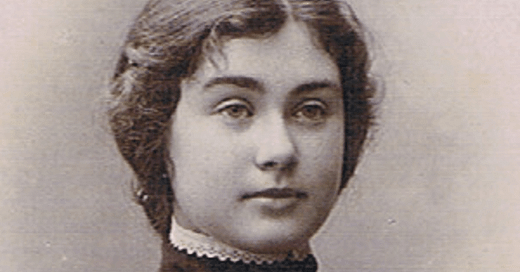This week I’m happy to share with you a short poem by Anna Margolin. Margolin—the best-known pen name of Rosa Lebensboim—was born in Lithuania, in 1887. After living in Konigsberg, Odessa, and Warsaw, she moved to New York in her late teens, where she threw herself into Lower Manhattan’s Jewish intellectual and artistic community. She was a precocious writer, and a pioneer of Yiddish women’s literature. Margolin earned quick acclaim for her journalism, poetry, and short stories, and found success in New York’s Yiddish press, writing and editing for newspapers like Fraye Arbeter Shtime, (The Free Voice of Labor), an influential Yiddish anarchist publication that ran from 1890 until 1977.
But her peripatetic youth gave way to a peripatetic young adulthood, and she left Manhattan to live in London, Paris, and Warsaw, where she married the Hebrew writer Moshe Stavski. She moved with him to Tel Aviv, but in 1913, at 26 years old, left him and her son to return to New York. Already her life seems exceptionally full, and exceptionally restless.
Again Margolin found work in New York’s Yiddish press, writing, among other things, a weekly column on women’s issues for the newspaper Der Tog, traveling to Europe as a foreign correspondent, and arguing for women’s suffrage.
In 1929, her sole poetry collection was published, and from there she seems to have descended into an isolation and depression that lasted the lasted the rest of her life. Although influential critics praised her writing, she was devastated by what she saw as its tepid reception, and by 1932 she had given up writing poems. Until her death in 1952 she lived as a recluse, suffering deeply from poor mental and physical health.
Here is the epitaph she chose for her gravestone, an adaptation of an earlier poem. It is devastating and hard to read, and shows the despair in Margolin spent her final years, if not her final decades. (This is Shirley Kumove’s translation; I didn’t think I could do any better, and in fact thought I would probably do worse.)
She squandered her life on rubbish, on nothing. Perhaps she wanted it so, perhaps she desired this misery, these seven knives of anguish to spill this holy living wine on rubbish, on nothing. Now she lies with shattered face. Her ravaged spirit has abandoned its cage. Passersby, have pity, be silent— say nothing.
Margolin asked that her unpublished poems be destroyed after her death, a request which was apparently fulfilled.
Most of what we know about her life comes from the memoir of Reuven Iceland, her long-term partner, and from her surviving letters. Who was she? What drove her from city to city, continent to continent, for the first 26 years of her life?
“Be silent—
say nothing.”
Margolin’s influence as a pioneering and iconoclastic feminist writer outlived her and has only grown; the poems from her only collection have seen many expert translations, including by Adrienne Rich. Shirley Kumove’s Drunk from the Bitter Truth is a phenomenal Yiddish-English edition of her work.
Here is a photo of Margolin around age 16, in what were perhaps happier times.
Full of Night and Tears
A sudden, deep silence
between us both,
like a stunned letter
with its omens of goodbye.
Like a sinking ship.
A silence with no glance, no touch,
full of night and tears
between us both,
as if we were ourselves
shutting the door
to the garden of eden.
This is a relatively minor poem of Margolin’s, and maybe not as accomplished as many of her better-known writings. (If it piques your interest, though, I really recommend finding a copy of Kumove’s translations.)
Nevertheless I’m taken by this short “break-up song.” The silence in this poem seems to be a dynamic and elemental creature, something very much alive and almost God-like in the way it shifts forms, and cannot be fully articulated. “Silence… like a sinking ship.” Isn’t that the perfect image for this moment in the poem?
And that final statement, “A silence… as if we were ourselves / shutting the door / to the garden of eden,” I find tremendously moving. It transposes whatever specific relationship the poem is describing into a universal experience of paradise lost, of traumatic departure from safety, fulfillment, bliss. And this transposition is all the more powerful because “we” as the ones who have forced it to take place, who have shut the door to Eden behind us.
Anachronistic though it is, I’m reminded here of Walter Benjamin’s famous image of the Angel of Paradise, from his Theses on the Philosophy of History, and of Jonathan Boyarin’s commentary on that passage. Boyarin writes:
“The eviction of Adam and Eve, like all of the past, is not a one-time event that occurred at what Watergate defendants would call a point in time. Part of the import of Benjamin’s image is the lesson that we are always once again being driven out; in some sense we have always just lost paradise, hence we are always close to it.”
The characters in Margolin’s poem are not at all distant from the paradise they once knew, and this suggests what Boyarin is saying as well: the tragedy is not only that we must leave the garden, and not only that we are the ones who banish ourselves from it, but also that the garden is always so tantalizingly close, so almost-accessible, even as we can never enter it again.
This resonates with me in ways I can’t quite articulate. But every paradise I’ve lost, every retrospectively-wonderful eden I find myself nostalgic for, always seems to be at once irrevocably closed to me and infinitely close.
Also—did you notice that this poem consists only of incomplete sentences? It’s deftly done, and suggests in form what the poem describes in content: an incomplete relationship, unstably frozen in the moment of its irresolution.
Please don’t psychoanalyze me based on the last few weeks of this newsletter! Next time I’ll share a happier poem. Until then, thanks, as always, for reading.






